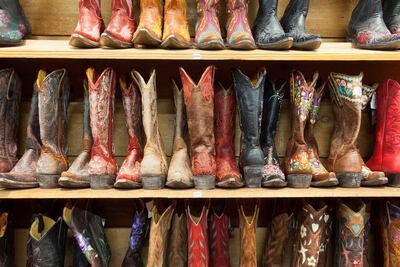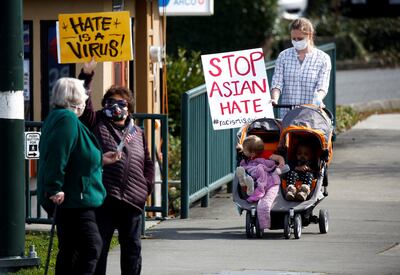It should be an exciting time for Kuo Zhang, 31, a Chinese woman living in a suburb near Dallas.
She is expecting a child with her husband, a US citizen, in a few months. They own a small home and are looking to buy a larger one to accommodate the newborn.
But a proposed law in the Texas state legislature is giving her pause. The measure would ban Chinese, Russian, Iranian and North Korean citizens living in the southern state from owning land and homes.
“Our situation is a lot better than other families,” Ms Zhang told The National. “But still, for us it will be a problem — if we apply for a mortgage, is my name allowed to be on the mortgage?”
The measure is part of two bills recently filed in the Republican-controlled legislature that would limit the property rights of Asian immigrants.
Texas Governor Greg Abbott tweeted that he “will sign it”, defending the measure under the guise of national security concerns.
“The growing ownership of Texas land by some foreign entities is highly disturbing and raises red flags for many Texans,” said state Senator Lois Kolkhorst, who filed one of the bills.
“By comparison, as an American, go try to buy land near a Chinese military base and see how it works out for you. It would never happen there and it shouldn't happen here.
“Passing this law delivers some basic safeguards to ensure Texans remain in control of Texas land.”

Two other states, Georgia and Tennessee, have already proposed similar measures.
Chinese groups have criticised the proposals, calling them a racist reflection of laws that banned certain nationalities, including Chinese, from immigrating to the US in the late 1800s.
“They are literally telling people that every single Chinese [person] is suspicious,” said Hailong Jin, director of the DFW-Chinese Alliance in Dallas. “That’s very scary.”
Amid the backlash, Texas legislators this month moved to soften language in the bill to allow dual citizens and Green Card holders to buy property.
But that is not enough to ease Ms Zhang's fears.
“The fundamentals of the bill are discriminatory even if they loosened up a little,” she said.
Just last week, Texas Representative Tony Tinderholt introduced another bill that would block Chinese citizens from attending the state's public universities and colleges.
Alice Yi is a Chinese immigrant and chairwoman of the Austin chapter of the Asian Pacific Islander American Public Affairs Association, or Apapa.
Ms Yi said the bill would be discriminatory against all people who appear to be Asian, regardless of their nationality or legal status.
“We have to prove we’re legal here first, then we can purchase,” she said. “This puts us as a second-class citizen, or a third-class citizen.”
Although the proposal would also ban other nationalities, including Russians, North Koreans and Iranians, from buying property, the Chinese community has been its most vocal opponent.
Iranian-American groups in the state, for example, did not respond to questions from The National.
A representative from the Iranian-American Community of North Texas declined to comment on the bill, saying their group was more focused on international human rights issues in Iran than they are local issues.

Mark Jones, a political science professor at Houston’s Rice University, said the bill was primarily designed to oppose China and the Biden administration.
“The legislation has nothing to do with race and ethnicity, it has to do with national security and larger goals of the Republican Party to push against China more than the Biden administration has been willing to do,” Prof Jones said.
But he said the unintended consequence of punishing groups of people based on their nationality would be unconstitutional.
“You’re adversely impacting a potential non-trivial number of people,” Prof Jones said. “What’s the security threat of somebody buying a home?”
Tuo Li, 23, a US Navy veteran and Chinese immigrant to Texas, said he understood the legislators’ desire to strengthen national security from Beijing's influence, but the ban was not the right way to do it
Mr Li is a Republican but is disappointed by the decisions of his elected officials.
“I served in the military,” he said. “I have a patriotic personality. I know these countries are kind of enemies, or imaginary enemies. It’s not the right way of fixing the problem.”
Mr Li works in Houston, the nation’s most ethnically diverse city, with nearly 1.7 million foreign-born residents, according to the US Census Bureau.
He said the city had several “Chinatown” neighbourhoods, with many Chinese-owned restaurants and other businesses that support a vibrant immigrant community.
“These people pay taxes,” Mr Li said. “If this bill is going to pass, it’s stabbing the economy.”
The proposal also comes after several years of increase in hate crimes against Asians in Texas and across the US.
It was sparked by the Covid-19 pandemic and fanned by conspiracy theories and speeches by Republicans, including former president Donald Trump.
Ms Zhang said that made her worry more about her personal security, and that measures like this one only exacerbate those concerns.
She said that if the state’s political leaders approved the measure, it could indicate to some that other anti-Asian action is all right.
“The politicians naming specific groups and isolating us and saying we’re a threat to national security is troubling,” Ms Zhang said.
“I’m more cautious of my surroundings. I’m really trying to be more careful.”


